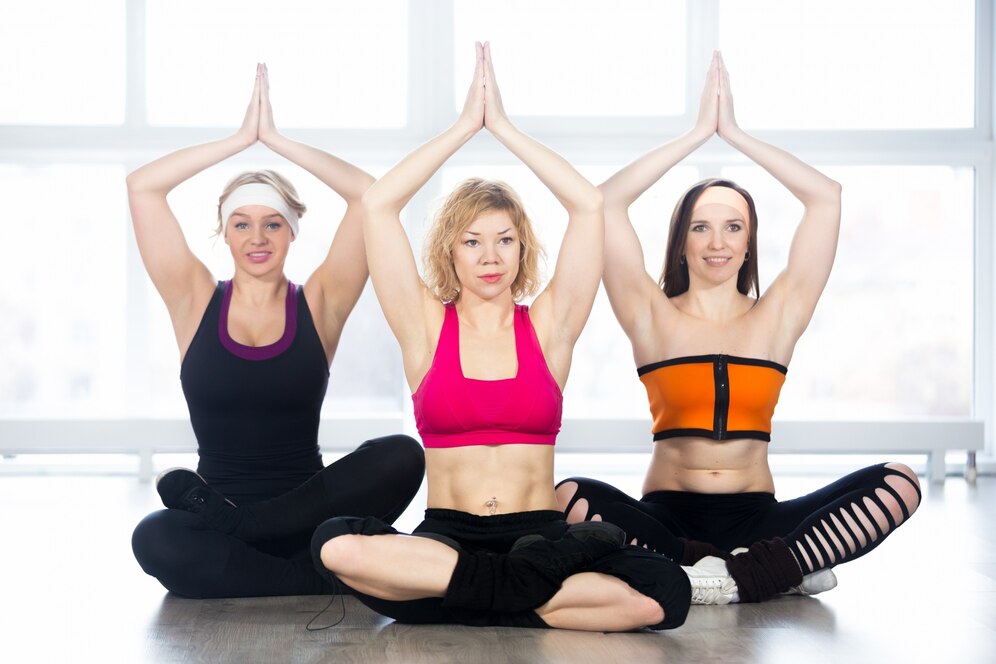Yoga poses for 3 offer a remarkable chance to investigate the act of yoga in a social environment. In this article, we will dig into the universe of triplet yoga presents, investigating their advantages, varieties, and how they can improve your yoga practice.
Rehearsing yoga is in many cases seen as an individual excursion, an opportunity to interface with oneself and discover a true sense of reconciliation. Be that as it may, yoga can likewise be a significantly mutual encounter, uniting individuals in a common quest for wellbeing and prosperity.
Yoga poses for 3 professionals, otherwise called triplet presents, embody this feeling of local area, requiring cooperation, correspondence, and trust between members. In these represents, every individual plays a special part, cooperating to make delightful and adjusted shapes. This article will investigate the universe of yoga models for three, featuring their advantages, varieties, and how they can develop your training while at the same time encouraging a feeling of association with others.
Yoga poses for 3 deal a dynamic and connecting method for rehearsing yoga, consolidating the advantages of individual practice with the delight of shared insight. These postures require an elevated degree of coordination and participation, as every professional should adjust their developments to the others to accomplish congruity in the posture. Furthermore, triplet presents frequently include components of help and equilibrium, provoking members to confide in their accomplices and themselves. Through rehearsing yoga models for three, experts can foster actual strength and adaptability as well as relational abilities like correspondence, sympathy, and collaboration.

One of the exceptional parts of Yoga poses for 3 is the feeling of solidarity and association they encourage among members. Dissimilar to individual practice, which can here and there feel disconnecting, triplet presents expect specialists to be completely present and drawn in with one another. This common center makes a strong connection between members, upgrading the general insight of the training. Moreover, rehearsing yoga models for three can be a lively and upbeat experience, as members cooperate to investigate new shapes and developments. Whether you’re rehearsing with companions, family, or individual yogis, yoga models for three proposition a tomfoolery and remunerating method for extending your training and reinforce your connections.
Advantages of Yoga Poses for 3
Yoga poses for 3 experts offer a scope of advantages for the psyche, body, and soul. Rehearsing these postures can further develop equilibrium, strength, and adaptability while advancing collaboration, correspondence, and trust among members. Moreover, triplet stances can give a feeling of achievement and kinship, as professionals cooperate to accomplish a common objective. These postures can likewise be a tomfoolery and fun loving method for investigating development and innovativeness with others.
Key Components of Yoga Poses for 3
Yoga poses for 3 specialists ordinarily include a base, a flyer, and a spotter. The base is the individual who gives the establishment and solidness to the posture, frequently lying on the ground or supporting the flyer with their hands or feet. The flyer is the individual who is lifted or upheld by the base, frequently adjusting on the base’s feet or hands. The spotter is the individual who helps and guarantees the security of the base and flyer during the posture.

Well known Yoga Poses for 3
Trio Boat Pose: Here, one professional sits in a boat present (Navasana) while the other two specialists support their legs, making a steady base. This posture fortifies the center and further develops equilibrium and coordination.
Trio Descending Dog: Here, one expert expects a descending canine (Adho Mukha Svanasana) position while the other two professionals support their legs, making a three-sided shape with their bodies. This posture extends the back and hamstrings and further develops shoulder strength.
Trio Champion III: Here, one expert stands in a hero III (Virabhadrasana III) position while the other two specialists support their lengthy leg, making a steady base. This posture further develops equilibrium, strength, and concentration.
Trio Shoulder Stand: Here, one expert expects a shoulder stand (Sarvangasana) position while the other two professionals support their legs, making a steady base. This posture extends the shoulders and neck and further develops dissemination.
Trio Camel Pose: Here, one expert expects a camel present (Ustrasana) position while the other two professionals support their back and hips, making a steady base. This posture extends the front of the body and further develops adaptability in the spine.

Ways to rehearse Yoga Stances for Three
Communicate: Openness is of the utmost importance while rehearsing triplet yoga presents. Guarantee that all specialists are agreeable and grasp their jobs in the posture.
Start Slow: Start with straightforward postures and steadily progress to further developed acts like your gathering turns out to be more agreeable and certain.
Use Props: Props like blocks, lashes, or covers can be utilized to help the base or flyer and make the stances more open.
Focus on Breath: Urge specialists to zero in on their breath and remain present during the stances. This can assist with further developing fixation and care.
Yoga poses for 3 specialists offer a one of a kind and remunerating method for extending your training while at the same time interfacing with others. Whether you’re hoping to work on your equilibrium, strength, or adaptability, rehearsing threesome yoga postures can give a tomfoolery and connecting method for accomplishing your objectives. So accumulate your companions or individual yogis and investigate the magnificence and advantages of triplet yoga presents together, and experience the delight of yoga in an entirely different manner.
Read More Article Flare yoga pants

I don’t think the title of your article matches the content lol. Just kidding, mainly because I had some doubts after reading the article.